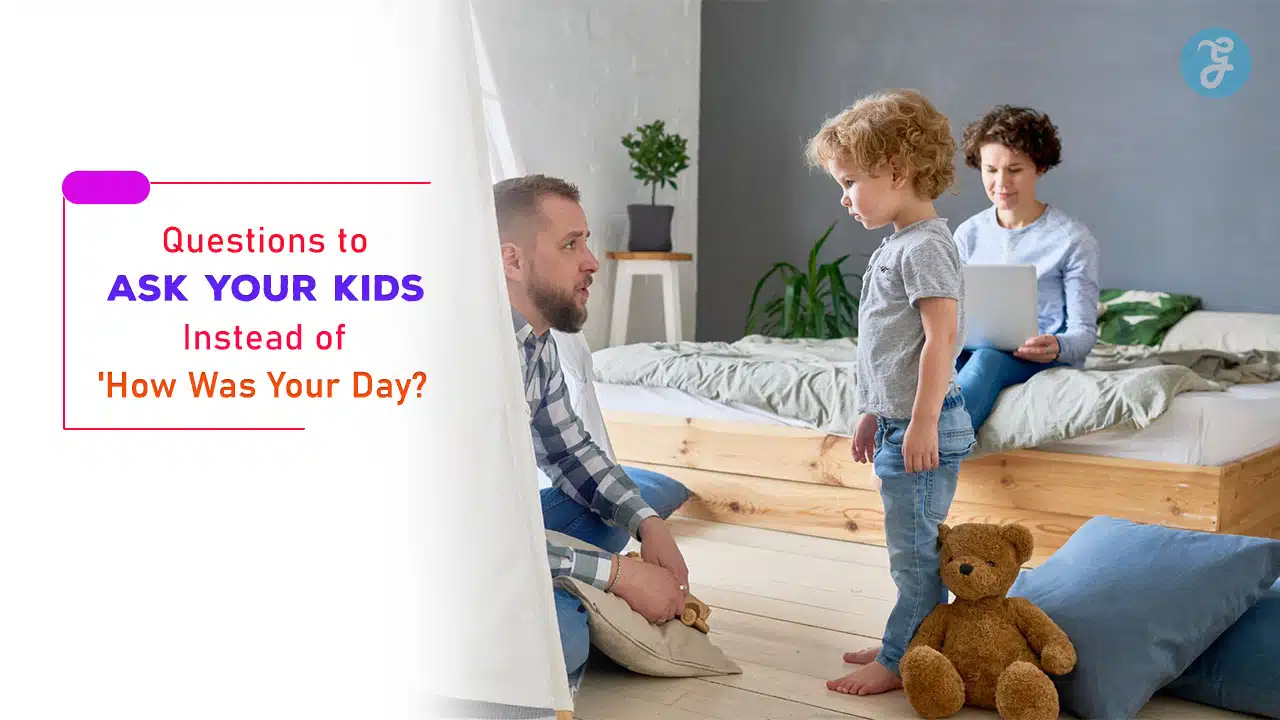Asking your child “How was your day?” often results in a one-word answer like “fine” or “good,” which can be frustrating when you’re trying to connect with them.
However, children are more likely to open up if they’re asked engaging, specific questions that invite them to reflect on their experiences.
By varying the types of questions you ask, you encourage meaningful conversations that can help strengthen your relationship and gain insight into their thoughts and feelings.
In this article, we’ll explore 50 alternative questions to ask your kids instead of ‘How was your day?’ that go beyond the usual, encouraging deeper conversations and allowing your child to express themselves more freely.
1. What was the best part of your day?
This question shifts the focus to positive experiences, prompting your child to reflect on the highlights of their day and share something that made them feel happy or excited.
Pro Tip:
Follow up by asking why that part stood out, encouraging them to elaborate and share more details.
2. Did anything make you laugh today?
Laughter is a great icebreaker. Asking this question helps your child recall lighthearted moments and fosters a conversation around humor and joy.
Pro Tip:
Sharing your own funny moment from the day can help get the conversation flowing.
3. Who did you sit with at lunch today?
This question gives you insight into your child’s social interactions and friendships, helping you understand who they connect with during the day.
Pro Tip:
If your child mentions sitting alone or with different people, gently ask if there’s something going on socially.
4. What was the most challenging part of your day?
Asking about challenges allows your child to express frustrations or difficulties they encountered, helping you understand what may be troubling them.
Pro Tip:
Offer support or advice if appropriate, but sometimes just listening is the best approach.
5. Did you learn something new today? What was it?
This question encourages your child to share their learning experiences, whether academic or personal, promoting curiosity and reflection.
Pro Tip:
Discuss how they can use this new information in their daily life or future situations.
6. What was the most interesting thing your teacher said today?
This question prompts your child to recall something memorable or unique that their teacher shared, fostering a conversation about education and learning.
Pro Tip:
Follow up by asking how they felt about what their teacher said or if it changed their perspective on anything.
7. Did you help anyone today?
This question encourages empathy and helps your child think about how their actions impact others, fostering kindness and social responsibility.
Pro Tip:
Praise their efforts and discuss the importance of helping others, no matter how small the gesture.
8. Was anyone kind to you today?
You can gain insight into your child’s social dynamics and friendships by evaluating how their peers treat them using this question.
Pro Tip:
Encourage your child to reflect on how kindness made them feel and how they can spread kindness to others.
9. What did you play during recess?
This question gives you a glimpse into your child’s activities during free time, which can tell you a lot about their interests, energy levels, and friendships.
Pro Tip:
If they mention a game or activity you’re unfamiliar with, ask them to explain the rules or how it works.
10. If you could change one thing about today, what would it be?
Asking this encourages your child to think critically about their day and how they might improve it.
It opens the door to discussing their dislikes or frustrations in a constructive way.
Pro Tip:
Discuss possible solutions or ways to handle similar situations in the future.
11. What did you do that made you feel proud today?
This question promotes self-reflection and allows your child to focus on their achievements, boosting their self-esteem and confidence.
Pro Tip:
Celebrate their accomplishment, no matter how small, and encourage them to keep striving for success.
12. What did you do that made you feel creative today?
Encouraging your child to share moments of creativity helps them explore and express their imagination, whether through art, writing, or problem-solving.
Pro Tip:
Ask follow-up questions to dive deeper into their creative process and ideas.
13. Did you feel bored at all today? Why?
Understanding when and why your child felt bored can help you identify areas where they might need more stimulation, whether academically or socially.
Pro Tip:
Ask what they could do differently next time to make those moments more engaging or enjoyable.
14. What’s something you’re looking forward to tomorrow?
This question helps your child think about the future in a positive light, encouraging them to feel excited about the next day.
Pro Tip:
If they’re struggling to find something, help them identify small moments or activities they can look forward to.
15. What’s one thing you learned that surprised you today?
Asking about surprises can lead to interesting conversations about unexpected experiences or new insights your child gained during the day.
Pro Tip:
Share something surprising from your own day to keep the conversation going.
16. Was there a moment today when you felt really happy?
This question prompts your child to reflect on a specific moment of happiness, helping them recognize the positive emotions they experienced.
Pro Tip:
Ask what made that moment so special and how they can create more moments like it.
17. What’s something you did today that made someone else smile?
Focusing on making others happy encourages empathy and thoughtfulness, helping your child understand the power of their actions.
Pro Tip:
Talk about the importance of spreading positivity and how small gestures can make a big impact.
18. Did you try something new today? How did it go?
This question helps your child reflect on new experiences, whether they were successful or challenging. It encourages a growth mindset and resilience.
Pro Tip:
Praise their willingness to try something new, even if it didn’t go as planned, and discuss what they learned from the experience.
19. Did anything make you feel frustrated today?
This question invites your child to express their frustrations, helping you understand what challenges they faced and how they handled them.
Pro Tip:
Offer guidance on how to manage frustration in a healthy way and discuss possible solutions for future situations.
20. Who did you talk to the most today?
This question helps you learn more about your child’s social interactions and who they feel comfortable talking to, which can provide insight into their friendships.
Pro Tip:
Ask what they talked about to deepen the conversation and learn more about their interests.
21. Did anyone do something that surprised you today?
This question encourages your child to think about unexpected actions or behaviors from others, which can lead to discussions about social dynamics or new experiences.
Pro Tip:
Ask how they felt about the surprise and whether it was positive or negative.
22. What’s something you’re curious about right now?
Tapping into your child’s curiosity helps you learn more about their interests and passions, sparking conversations about exploration and discovery.
Pro Tip:
Offer to help them explore their curiosity further, whether through books, experiments, or creative projects.
23. What’s something you did today that made you think hard?
Asking about cognitive challenges encourages your child to reflect on moments when they had to solve a problem or think critically.
Pro Tip:
Discuss how they approached the challenge and offer suggestions for tackling similar tasks in the future.
24. Did anyone need your help today?
This question encourages your child to think about how they contribute to others’ well-being, fostering a sense of responsibility and kindness.
Pro Tip:
Reinforce the importance of helping others and praise their willingness to assist.
25. Did anything make you feel disappointed today?
Disappointment is a common feeling, and this question allows your child to express when things didn’t go as planned, helping you support them emotionally.
Pro Tip:
Talk about ways to handle disappointment and turn it into a learning experience.
26. What’s one thing you wish you could have done differently today?
Encouraging self-reflection helps your child think about their actions and how they can improve in the future, fostering growth and personal development.
Pro Tip:
Offer positive reinforcement and discuss how they can apply this reflection moving forward.
27. What’s the coolest thing you saw today?
This question prompts your child to share something visually or intellectually exciting, helping you understand what sparks their interest.
Pro Tip:
Ask follow-up questions about why they found it cool and how it made them feel.
28. What’s something you did today that made you feel brave?
This question encourages your child to think about moments when they stepped out of their comfort zone, promoting courage and resilience.
Pro Tip:
Celebrate their bravery and discuss how they can continue to take on challenges with confidence.
29. What did you do during free time?
Free time can reveal a lot about your child’s interests and creativity.
This question helps you learn more about how they choose to spend unstructured time.
Pro Tip:
If they mention an activity they enjoy, ask how you can support or encourage them to pursue it further.
30. Did you have any moments today where you felt really proud of yourself?
This question promotes self-confidence by encouraging your child to reflect on their achievements and moments of pride.
Pro Tip:
Help them recognize their strengths and encourage them to continue building on those positive moments.
31. If you could replay one moment from today, what would it be?
This question encourages your child to reflect on a specific moment they enjoyed or wish they could experience again, giving you insight into what brings them joy.
Pro Tip:
Ask what made that moment so special and if they could recreate something similar in the future.
32. What’s something you’re grateful for today?
Gratitude helps shift focus toward positive experiences.
This question encourages your child to think about the good things in their day, promoting a positive mindset.
Pro Tip:
Start a family gratitude journal where everyone writes one thing they’re grateful for each day.
33. Did you learn anything about yourself today?
This question promotes self-awareness and encourages your child to reflect on their emotions, actions, or decisions.
Pro Tip:
Share something you learned about yourself that day to keep the conversation going.
34. What’s something you’re excited to learn more about?
This question taps into your child’s natural curiosity and encourages them to think about future learning opportunities, whether in school or at home.
Pro Tip:
Explore ways to help them dive deeper into their interests, whether through books, online resources, or hands-on activities.
35. What’s one way you showed kindness today?
Focusing on kindness encourages empathy and thoughtfulness, helping your child recognize how their actions impact others.
Pro Tip:
Discuss how small acts of kindness can make a big difference in others’ lives and reinforce the importance of being kind.
36. Did anyone say anything today that made you think differently?
This question encourages critical thinking and helps your child reflect on how others’ perspectives influence their own thoughts and beliefs.
Pro Tip:
Ask them to explain how their thinking changed and whether they agree or disagree with the new perspective.
37. What’s something that made you feel really good about yourself today?
This question helps boost your child’s self-esteem by encouraging them to reflect on moments of pride or personal accomplishment.
Pro Tip:
Reinforce their positive feelings by praising their achievements and encouraging them to continue believing in themselves.
38. Did anything surprise you in a good way today?
Asking about positive surprises helps your child focus on unexpected moments of joy or excitement, fostering a positive mindset.
Pro Tip:
Share your own positive surprise from the day to create a shared conversation around unexpected happiness.
39. What’s something you wish you had more time for today?
This question helps your child reflect on how they spend their time and whether they feel fulfilled by their activities, providing insight into their priorities.
Pro Tip:
Discuss how they can manage their time differently to fit in the things they love or want to do more of.
40. Did you learn anything that made you feel confused?
This question opens the door for your child to express any confusion or difficulty they had with something they learned, allowing you to help clarify or guide them through it.
Pro Tip:
Offer to explain or work through the problem together, turning a moment of confusion into an opportunity for learning.
41. Did you have any moments where you felt left out today?
Feeling left out can be a difficult experience for children, and this question allows them to express their feelings about social dynamics without fear of judgment.
Pro Tip:
Listen carefully and offer support or advice on how to handle similar situations in the future.
42. What’s one thing that made you feel safe today?
Asking about safety helps your child reflect on the people, places, or situations that bring them comfort, encouraging a conversation about security and trust.
Pro Tip:
Discuss ways they can create more feelings of safety and security in their daily life.
43. If you could teach a class on anything, what would it be?
This question taps into your child’s interests and knowledge, encouraging them to think about their passions and what they enjoy sharing with others.
Pro Tip:
Encourage them to explore their chosen topic further and offer resources to help them learn more about it.
44. What’s something you did today that made you feel grown-up?
Children love feeling more responsible and capable.
This question allows them to share moments where they felt independent or mature.
Pro Tip:
Celebrate their growing independence and talk about how they can continue taking on more responsibility.
45. Did you try something you’ve never done before today?
Encouraging your child to share new experiences helps them reflect on personal growth and their willingness to step outside of their comfort zone.
Pro Tip:
Praise their bravery for trying something new and discuss what they learned from the experience.
46. Who inspired you today?
This question encourages your child to think about role models or peers who positively influenced them, helping foster a sense of admiration and aspiration.
Pro Tip:
Discuss why they found that person inspiring and how they can incorporate those qualities into their own life.
47. What’s something that made you feel grateful today?
Asking about gratitude encourages your child to focus on the positive aspects of their day, fostering a mindset of thankfulness.
Pro Tip:
Start a family gratitude ritual, where each person shares something they’re grateful for at the end of the day.
48. Did you notice anyone being left out today? How did that make you feel?
This question helps your child develop empathy and awareness of others’ feelings, prompting a discussion about inclusion and kindness.
Pro Tip:
Talk about ways they can help others feel included and supported in social situations.
49. What’s one thing you’re really proud of today?
This question encourages self-reflection and helps your child focus on their achievements, boosting self-confidence and promoting a positive self-image.
Pro Tip:
Celebrate their accomplishment with positive reinforcement and encourage them to keep aiming high.
50. If you could relive any part of your day, what would it be?
Asking about reliving moments helps your child reflect on the happiest or most exciting parts of their day, promoting positivity and gratitude.
Pro Tip:
Ask why they would want to relive that moment and what made it so special.
Conclusion
Engaging your child in meaningful conversations doesn’t have to be difficult.
By asking thoughtful, specific questions instead of the standard “How was your day?”, you can encourage them to open up, share their experiences, and express their emotions.
These 50 alternative questions provide a variety of ways to connect with your child, helping you build a stronger relationship while learning more about their daily life.
Remember, the key to meaningful conversations is not just asking the right questions but also listening attentively and responding with empathy.
By creating a safe space for your child to share, you foster a deeper bond and help them develop the communication skills they need to navigate their world.




































